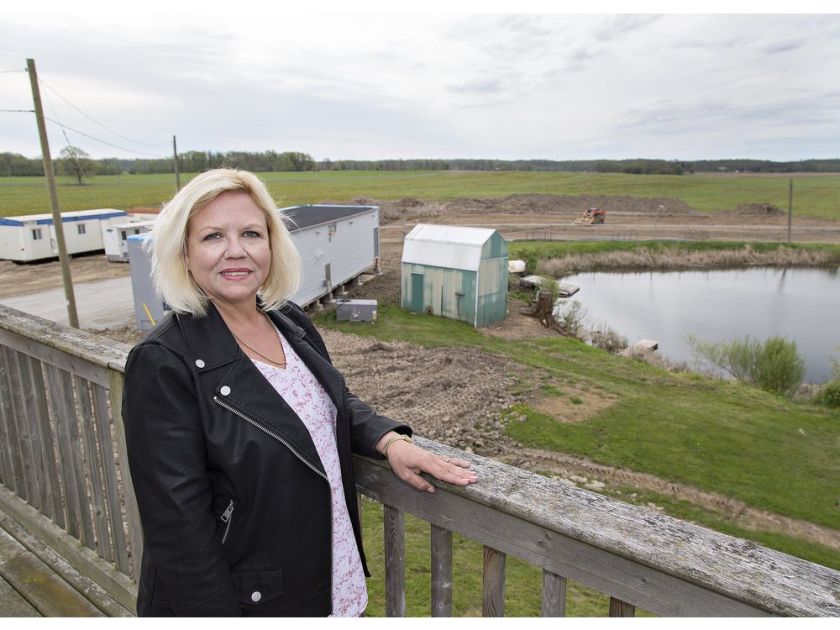You are here
Home 🌿 Marijuana Business News 🌿 Opportunity as big as all outdoors for first licensed outdoor pot grower 🌿Opportunity as big as all outdoors for first licensed outdoor pot grower

The 40-hectare farm in Southwestern Ontario will soon be home to the province’s first commercial outdoor cannabis crop when planting begins next month.
The operation east of Brantford — approved by Health Canada last week — will create nearly 200 jobs at the Southwestern Ontario pot producer 48North and catapult it into one of the country’s largest by capacity. Most of the crop will be used for cannabis extracts, concentrates and edibles — products that VanderMarel, 48North’s co-chief executive, believes will dominate the market once they’re introduced in the fall.
“Outdoor is the future, for sure,” she said, noting no other agricultural products produced for extraction are cultivated inside.
“We don’t grow grapes indoors for wine, or canola for canola oil.”
Since Health Canada announced last year it was lifting its ban on outdoor cultivation, cannabis companies have flooded the federal marijuana regulator with applications to license outdoor areas, which could be used for growing, composting or destruction. Around 190 applications remain in the queue, the agency says.
What’s driving all the interest? It costs 25 cents to grow a gram of marijuana outside, compared to $1 for greenhouse-grown cannabis and $2 for plants grown indoors, VanderMarel said.
“There’s our HVAC, there’s our lighting,” she said, gesturing to the sky. “The soil came with our farm.”
Although 48North just got the greenlight from Health Canada on Friday, the company has been readying the land since it bought the former organic pig-feed farm in October.
More than 2,500 metres of fencing equipped with razor wire, motion detectors and vibration censors surround the property, where 102 surveillance cameras monitor movements around the farm.
But no efforts will be made to hide the pot plants, which could hit heights of up to six metres, from passing motorists and neighbours.
Instead, a visitor’s centre is planned to educate the anticipated onlookers, some of whom have already been showing up at the property for a sneak peak, VanderMarel said.
“We know that people are going to be curious,” she said. “So we’d much rather share knowledge . . . explain what we’re doing.”
Some critics, including the heads of large licensed producers, initially questioned Health Canada’s embrace of outdoor cultivation, saying crops could be contaminated by neighbouring farms and would be easy prey for thieves.
But VanderMarel, who hails from a family of apple producers, and co-chief executive Allison Gordon jumped at the opportunity. Their company was the first to submit an application for outdoor cultivation and the first to get a new site approved.
Two other producers — one in Creemore, the other in Salt Spring Island, B.C. — were recently approved to grow outside at their existing operations.
Harvey Gracey of Cannabis Compliance, an industry consulting firm, warns outdoor growing will involve some trial and error.
“It’s new to everybody on a commercial scale.” said Gracey, a cultivation consultant. “There’s going to be a huge learning curve.”
At 48North’s Brant County operation, known as Good Farm, neighbouring farmers agreed to grow wheat, a pesticide-free crop, to avoid the risk of cross-contamination, VanderMarel said.
“It’s been great to work with local farmers,” she said.
The anticipated 40,000-kilogram yield from this season’s outdoor crop, combined with the roughly 5,000 kilograms from 48North’s indoor facilities in Brantford and Kirkland Lake, will cement the company’s place as one of Canada’s 10 biggest producers, VanderMarel said.
Workers at the site Wednesday were busy tilling the land and building three greenhouses, where thousands of cannabis seedlings — young plants grown from seeds, rather than cuttings — will be planted in the ground using a GPS-driven tractor in mid-June, VanderMarel said.
The farm is creating around 200 jobs though construction, harvesting and processing the cannabis at the company’s Brantford facility, VanderMarel said, adding staff will be hired from within the community, including the nearby Six Nations of the Grand River.
“A company should reflect the community we live and work in,” she said.
420 Intel is Your Source for Marijuana News
420 Intel Canada is your leading news source for the Canadian cannabis industry. Get the latest updates on Canadian cannabis stocks and developments on how Canada continues to be a major player in the worldwide recreational and medical cannabis industry.
420 Intel Canada is the Canadian Industry news outlet that will keep you updated on how these Canadian developments in recreational and medical marijuana will impact the country and the world. Our commitment is to bring you the most important cannabis news stories from across Canada every day of the week.
Marijuana industry news is a constant endeavor with new developments each day. For marijuana news across the True North, 420 Intel Canada promises to bring you quality, Canadian, cannabis industry news.
You can get 420 Intel news delivered directly to your inbox by signing up for our daily marijuana news, ensuring you’re always kept up to date on the ever-changing cannabis industry. To stay even better informed about marijuana legalization news follow us on Twitter, Facebook and LinkedIn.




